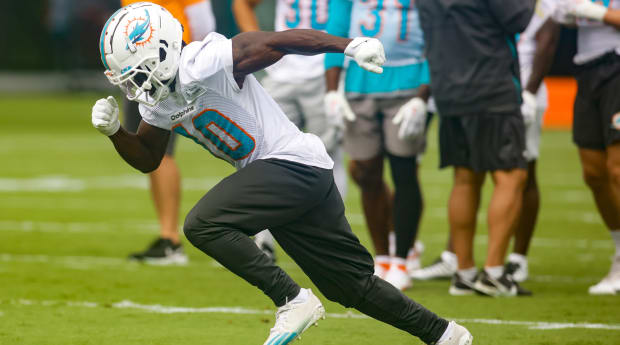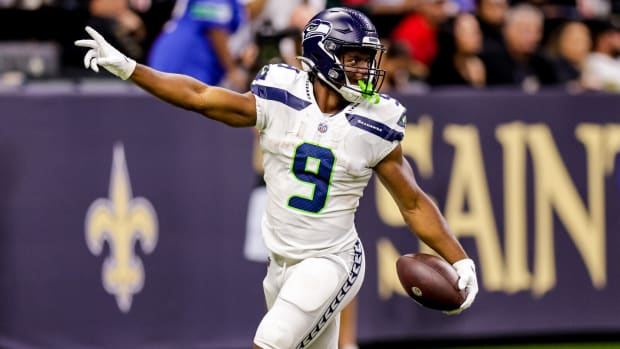There’s a saying that you can’t win your fantasy football championship in the first round, but you can lose it. With that premise in mind, let’s do our best to avoid losing in the first round and beyond as we move on to the second installment of the 2023 fantasy football draft strategy series, which dissects the best approaches from the fourth, fifth and sixth draft slots.

If you’re drafting first, second or third, you can find advice for how to proceed from those pick positions here. And if your slot falls in the latter half of the draft, fear not: Strategic breakdowns for picks 7-9 and 10-12 are coming next week.
Happy drafting!
Draft Slot Strategies: Picks 1-2-3 | Picks 4-5-6
(Note: The ADP data and draft strategy advice is intended for 12-team, PPR leagues.)
Drafting in Round 1

The board is wide open here in the middle of the first. Let’s assume that Justin Jefferson, Ja’Marr Chase and Christian McCaffrey have already been selected. If not, you should draft whichever one is still available and then go buy a scratch-off immediately. There is a dropoff after that trio, but it’s not as dramatic as you might think. It’s really up to you what kind of team build you want to start off with from one of these spots.
Let’s say you want to start off strong at receiver: Cooper Kupp and Tyreek Hill are both going in this range. Kupp was putting up comparable stats to his all-time 2021 season when he went down with an ankle injury last November. The Rams star led all receivers in scoring average (22.4) in nine games before his campaign was cut short. Hill, on the other hand, had his second-highest scoring fantasy season ever in his first year in Miami. He finished as the WR2 even as Tua Tagovailoa missed time. Hill also set a new career high with 1,710 receiving yards, which was the second-most in the NFL after Jefferson. Kupp and Hill both have high floors and sky-high ceilings.
Watch the NFL with fuboTV. Start your free trial today.

Sam Navarro/USA Today Sports
If running back is more of a priority, look no further than the reigning RB1, Austin Ekeler. The Chargers’ do-it-all back leads all skill position players with 38 total touchdowns over the last two seasons — the next-closest player is James Conner with 26. He’s scored over 340 fantasy points in back-to-back years and has the third-most points among all players over that stretch behind only Josh Allen and Patrick Mahomes. Ekeler agreed to a revised contract to stay in Los Angeles and the arrival of offensive coordinator Kellen Moore could be a boon for this offense.
Behind door No. 3 is the most consistently dominant player in fantasy football: Travis Kelce. He’s coming off the sixth TE1 campaign of his career, which saw him set career-best marks in targets (152), receptions (110) and receiving touchdowns (12). With JuJu Smith-Schuster gone, Mahomes could funnel even more targets toward his hulking tight end this coming year. Yes, Kelce is entering his age-34 season, but he’s missed just two games in the last five years.
Michael Fabiano has the aforementioned players ranked in the following order: Ekeler, Kupp, Hill, Kelce. Again, I’d be comfortable with any of them in this range, but just know that each route will set you on a different team-building path that should inform the rest of your draft.
Drafting in Rounds 2 and 3

In the second round you’re most likely choosing between the high-end WR2s, mid-tier RB1s or you can get the quarterback run going. I’m not particularly high on the receivers going in this range (DeVonta Smith, Chris Olave, Tee Higgins) compared with the talent available at running back (Tony Pollard, Derrick Henry) or even quarterback (Mahomes). Smith did finish as a top-10 receiver last season, though he and Higgins are both the No. 2 options in their offenses behind A.J. Brown and Chase, respectively. Olave is intriguing coming off a promising rookie year, but I wouldn’t trust him as my WR1 just yet.
So if you began your draft with Ekeler (or another running back), I like the idea of double-tapping the position with your first two picks. An Ekeler-Pollard pairing is an extremely strong start and then you can spend the next few rounds focused on receivers. However, I’m not opposed to the idea of pairing Hill or Kupp with one of the receivers in this range and waiting one more round for a running back. As you’ll begin to notice, running back average draft position has been depressed to the point that Josh Jacobs, the 2022 RB1, is coming off the board in the middle of the third round.

Mark J. Rebilas/USA TODAY Sports
Lastly, if you decided to pull the trigger on Kelce in the first, it’s hard to pass up the stack with Mahomes. They both finished No. 1 at their respective positions in 2022 and it’s reasonable to expect both players to repeat in that regard.
At this point in the third round, you should be looking for an RB1 if you went WR-WR with your first two picks or a WR1 if you went RB-RB. In the first scenario, Rhamondre Stevenson may still be on the board, Jacobs is going right in this range and Breece Hall and Najee Harris are available a few picks later. Stevenson is who I’d target here because of his pass-catching upside and lack of concerns compared with his competition — Jacobs could hold out, Hall is coming off a major injury and Harris has never been particularly efficient even if he’s guaranteed to see tons of volume.
In the second scenario, you might have to reach a few picks for your WR1 unless DK Metcalf is still available. I’m perfectly content with Keenan Allen, Calvin Ridley or Amari Cooper, all of whom are going in the early 30s, headlining my wide receiver room. Cooper had the best season of those four wideouts in 2022, but Metcalf and Ridley have demonstrated higher upside. Allen, who missed seven games last year, is entering his age-31 season, however he’s still as reliable as they come when he’s active.
At quarterback, Allen should also be in play here, although I don’t love the idea of waiting till the fourth round to find your RB1 or WR1. The 4-5-6 draft positions should put you in range for some of the second-tier signal callers a few rounds later.
Drafting in Rounds 4 and 5

It’s time to fill in RB2 or WR2 in the fourth round. It’s somewhat slim pickings at running back in this range, though. Perhaps Jahmyr Gibbs falls (doubtful) or you can reach for Joe Mixon (which could pay off in the long run). Travis Etienne Jr. is the one running back going right in this range and he’d be a great complement to a player who’s set to see 300-plus touches, such as Jacobs, Stevenson or Harris.
This is a relatively rich area of the draft for wide receivers, which is another reason the running-back heavy approach early on is appealing. Christian Kirk and Terry McLaurin both finished among the top 14 wideouts in 2022, which would make them more than serviceable WR2s. A few picks later, you’re looking at the likes of Mike Williams and DJ Moore and Brandon Aiyuk, who I’m high on this year.

Stephen Lew/USA TODAY Sports
In the fifth round you should be filling in your flex spot or considering a quarterback. As far as flexes go, you could do far worse than Aaron Jones, Kenneth Walker III, Chris Godwin or Diontae Johnson. Jones, Walker and Godwin all finished among the top 20 at their respective positions in 2022 and Johnson is due for positive touchdown regression after he failed to find the end zone on 86 receptions last season.
If your sights are set on a quarterback, a few different flavors are available. There’s Justin Fields, who’s coming off a QB7 campaign in which he ran for over 1,100 yards. Progress as a passer with the arrival of Moore in Chicago will make him even more of a fantasy asset. Or there’s Justin Herbert. He’s coming off a down year (by his high standards) during which he was plagued by a rib injury. With Moore taking over the offense, Herbert should look more like the version of himself we saw in 2020 and ’21. As an added plus, both quarterbacks could likely be stacked with one of their top targets — Fields with Moore or Herbert with Allen or Williams — from these draft slots.
Takeaways from Drafting Fourth, Fifth or Sixth
I liked how the board fell more from pick slots 1-2-3 than 4-5-6. The talent available in the first round is undeniable and offers a few more options than some other pick groupings as you can start with a running back, receiver or tight end. However, the draw in some of the later rounds (particularly the second and fourth) could be better. The RB-RB-WR-WR-RB/WR approach seemed like a hit if you can pull it off and I also liked the WR-WR-RB-RB-RB/WR route. Establishing either running back or wide receiver as a strength early on is appealing. You either have to hit quarterback extremely early and grab Mahomes, Jalen Hurts or Josh Allen or wait a few rounds and there’s no guarantee that Fields and Allen are still on the board when you pick in the fifth. In that case, you’ll likely end up punting on the position until much later.







